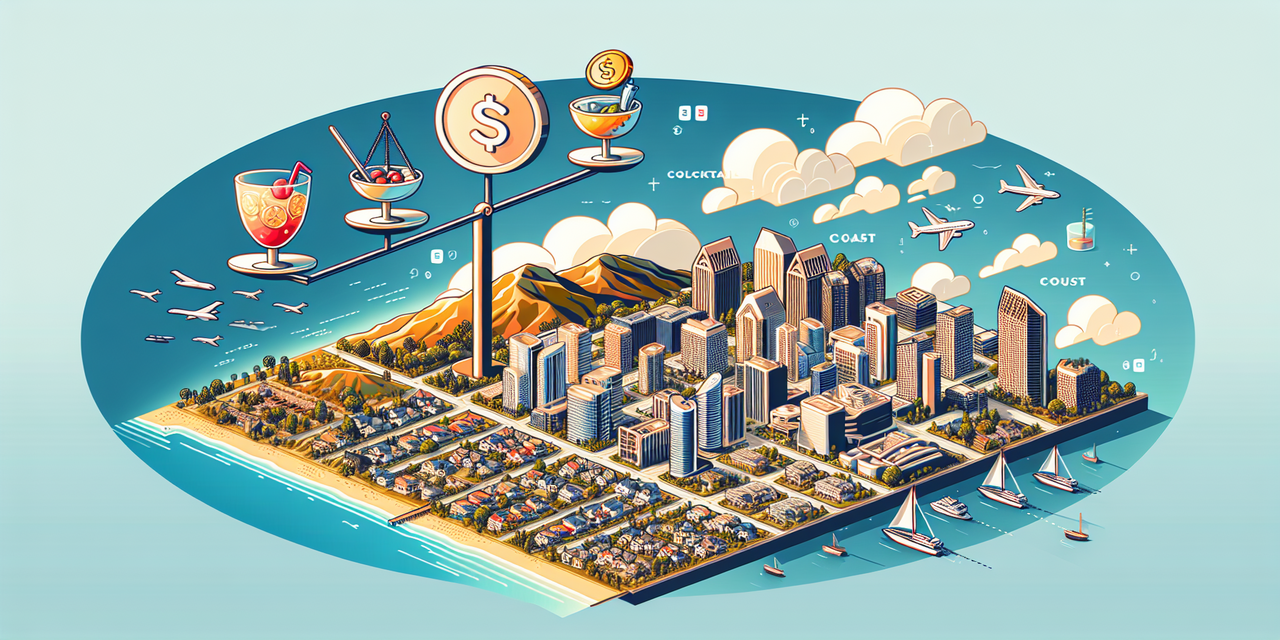San Diego Bartender Salary Guide and Cost-of-Living Comparison: Key Takeaways
- The average base hourly wage for bartenders in San Diego is approximately $18.47, aligning with the national average.
- Daily tips average around $200, which significantly supplement bartenders' total income.
- San Diego’s cost of living is about 45% higher than the national average, with housing costs exceeding 112% above average.
Exploring how San Diego bartenders earn and manage amid the city’s high cost of living uncovers essential insights on wages, tips, and expenses.
This guide provides a clear salary overview alongside a detailed cost-of-living comparison to support financial planning for bartenders.
For a broader breakdown of earnings, see our bartender salary guide.
1. San Diego Bartender Salary Overview
Bartenders in San Diego earn an average base pay of $18.47 per hour, closely matching the national average for this occupation. On a yearly basis, this translates to roughly $38,417 excluding any additional income from tips.
Tips play a substantial role in total earnings, with bartenders typically earning about $200 daily on average. This extra income can significantly boost their overall compensation, potentially adding thousands of dollars per year.
When combining base salary and tips, many bartenders' earnings reflect a more competitive compensation level compared to just the hourly wage.
If you're getting started locally, explore San Diego bartending requirements and training.
2. San Diego Cost of Living Challenges for Bartenders
Despite decent wages, bartenders in San Diego face a steep cost of living. The city’s cost of living is approximately 45% higher than the national average, creating financial strain for many workers.
Recent research highlights a bartender pay survey on how rising costs impact earnings.
Housing Costs Impact on Living Expenses
Housing is the leading cost factor. San Diego’s housing expenses are 112% above the national average.
The median home price hovers near $975,000, making homeownership out of reach for many bartenders on typical wages.
Rent is steep as well—average monthly rent for a one-bedroom apartment is approximately $3,147, a significant portion of the average bartender’s income.
Related roles vary in pay; see mixologist salary for comparison.
Utilities and Other Expenses in San Diego
Utilities also add to the cost burden, with monthly energy bills averaging around $353.58, about 42% higher than the national norm.
Overall, a single individual in San Diego can expect monthly living expenses near $7,000, summing up to about $84,000 annually.
3. Implications of Salary and Cost of Living for San Diego Bartenders
Given the average bartender base salary and typical tips, total annual income often falls short of covering San Diego’s living costs.
A typical bartender’s combined earnings might struggle to meet the roughly $84,000 yearly cost needed for basic single-person expenses.
This financial gap implies bartenders must consider strategies such as seeking additional income, living with roommates, or working in higher-paying venues.
Strategies to Manage Costs on Bartender Income
- Sharing housing expenses through roommates or shared apartments.
- Supplementing income with side jobs or gigs.
- Targeting upscale establishments where tips tend to be larger.
- Negotiating for higher wages, benefits, or tip pooling arrangements where possible.
For budgeting and saving tips, review bartender finances guidance.
Bar owners aiming to attract top talent can learn how to hire a bartender that customers love.
4. San Diego Bartender Salary Comparison to National Average
The $18.47 hourly wage in San Diego is aligned with the national average for bartenders, reflecting a competitive pay rate given the professional skills required.
Yet in contrast to other regions with lower costs of living, this wage goes less far in San Diego due to elevated housing and utility prices.
For example, in cities with more affordable housing, bartenders may maintain a similar wage but enjoy significantly lower monthly expenses, resulting in greater discretionary income.
To understand role expectations, review bartender job duties.
5. Best Resources for San Diego Bartenders
To navigate wage standards, labor rights, and local regulations, bartenders in San Diego can consult authoritative resources:
- California Department of Industrial Relations – for worker rights and wage laws.
- City of San Diego Official Website – for local ordinances and housing resources.
- U.S. Bureau of Labor Statistics – for national and regional data on wages and employment trends.
Candidates and hiring managers can use our bartender interview prep to practice realistic questions.
San Diego Bartender Salary Guide and Cost-of-Living Comparison: Conclusion
Bartenders in San Diego earn wages consistent with the national average, with average tips providing a valuable income supplement.
However, the high cost of living—with housing and utilities well above average—creates financial challenges not fully offset by typical bartender earnings.
Many bartenders must employ cost management tactics or seek better paying opportunities to maintain financial stability in San Diego’s unique economic environment.
For structured evaluations, see our interview bartenders guide.

.png)

.png)
.jpg)